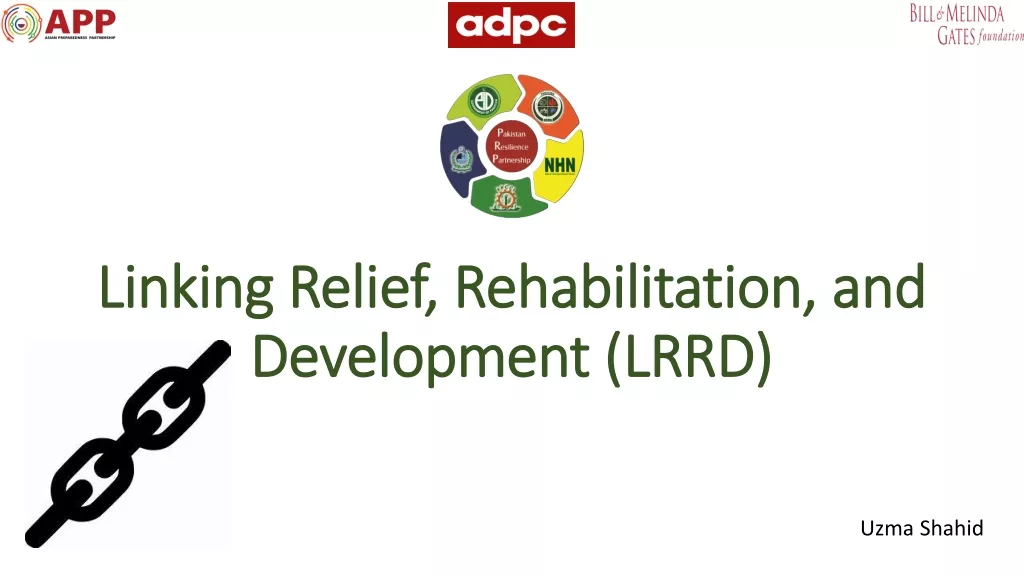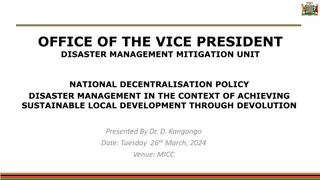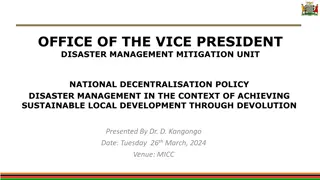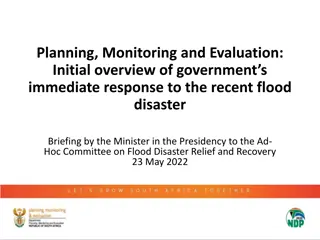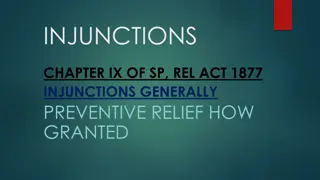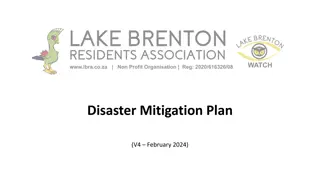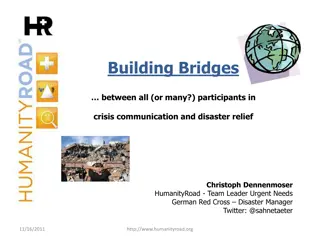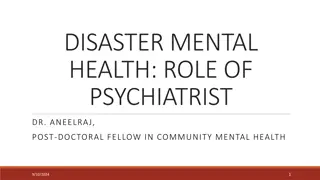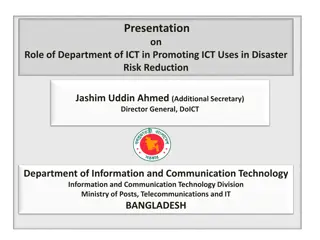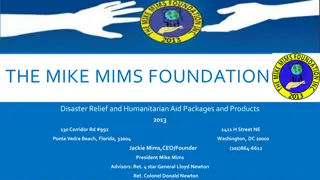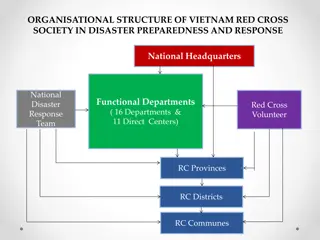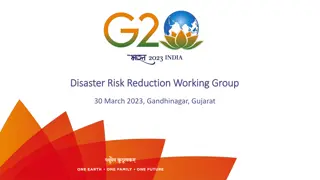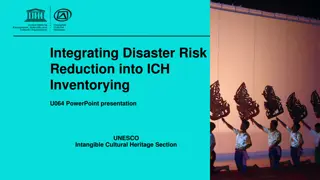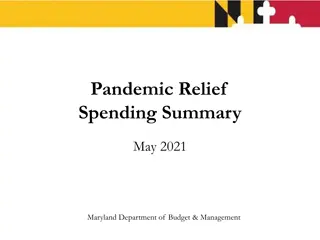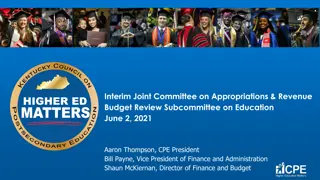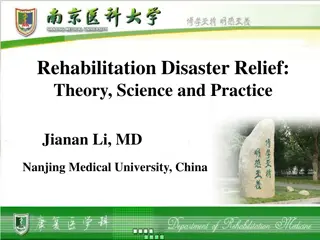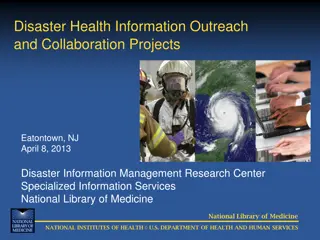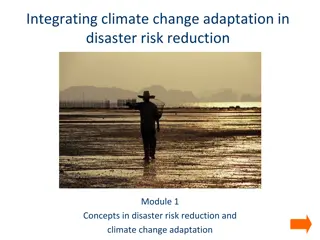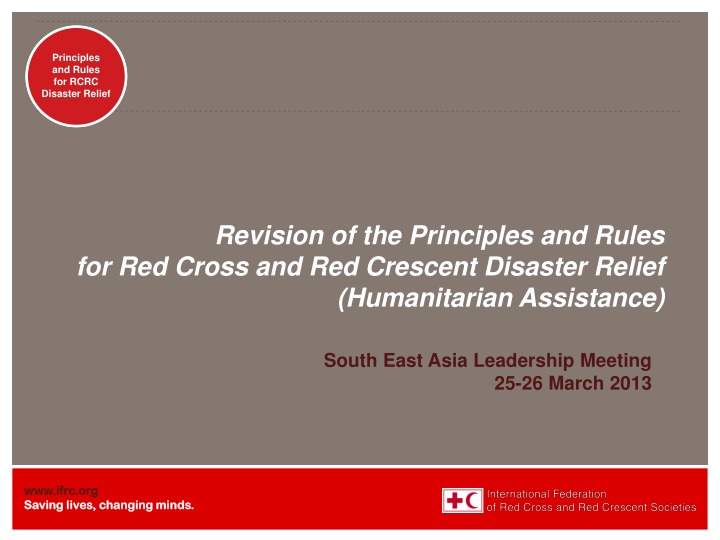
Principles and Rules for Disaster Relief Revision Process
This content discusses the revision process of the Principles and Rules for Disaster Relief by the Red Cross and Red Crescent organizations in South East Asia. It outlines the historical background, timeline of consultations, and expert feedback gathered for the development of the revised draft. The session details the steps taken from initial consultations to the final approval stages, emphasizing the importance of cooperation and preparedness in responding to disasters. The update on consultations with National Societies showcases a comprehensive approach towards improving disaster management strategies.
Download Presentation

Please find below an Image/Link to download the presentation.
The content on the website is provided AS IS for your information and personal use only. It may not be sold, licensed, or shared on other websites without obtaining consent from the author. If you encounter any issues during the download, it is possible that the publisher has removed the file from their server.
You are allowed to download the files provided on this website for personal or commercial use, subject to the condition that they are used lawfully. All files are the property of their respective owners.
The content on the website is provided AS IS for your information and personal use only. It may not be sold, licensed, or shared on other websites without obtaining consent from the author.
E N D
Presentation Transcript
Principles and Rules Disaster Management for RCRC Disaster Relief Revision of the Principles and Rules for Red Cross and Red Crescent Disaster Relief (Humanitarian Assistance) South East Asia Leadership Meeting 25-26 March 2013 www.ifrc.org www.ifrc.org Saving lives, changing minds. Saving lives, changing minds.
Overview: Principles and Rules for RCRC Disaster Relief P&R regulates procedures and responsibilities of the components of the Movement to cooperate, prepare for and respond to disasters. The Statutes of the Movement as well as the Constitution of the Federation stipulate that disaster response has to be conducted in accordance with the P&R. The Revision process has continued according to the plans and is reaching the end of the first consultation round (200 participants from 94 NS, IFRC, ICRC). Draft zero was sent to all NS in December 2012 www.ifrc.org www.ifrc.org Saving lives, changing minds. Saving lives, changing minds.
Background: History of the P&R for RCRC Disaster Relief 1954 first developed 1969 adopted by the IC: Amended in 1973, 1977, 1981, 1986, 1995 (noted) 2007 the Governing Board decided to review the P&R Tsunami Forum recommendations Revised Constitution The New Operating Model Seville Agreement (1997) and its Supplementary Measures (2005) On-going policy revision process in DM area 2008-2009 review and consultation process Revision submitted to the Governing Board in 2009 The GB requested the Secretary General to continue consultations with National Societies www.ifrc.org www.ifrc.org Saving lives, changing minds. Saving lives, changing minds.
SESSION 1 Revising P&R 2012-2013 : Timeline NS consultation meetings in the Zones and expert consultations NS feedback on the revised draft 1 Consultation process developed GB approval of the revised P&R Draft 2 to DCMAB and GSMT 2011 2012 2013 Adoption of the consultation process by GB Final draft of the revised P&R GA and CoD approval of the revised P&R Update to GB on consultation progress Draft 1 P&R developed based on consultation inputs www.ifrc.org www.ifrc.org Saving lives, changing minds. Saving lives, changing minds.
Principles and Rules revision process: Update Consultations 9 National Society consultations between April - December 2012 reached over 250 leaders and DM practitioners from 118 NS Expert groups: ICG/DMWG, NS Legal Advisers, Audit & Risk Committee, DM Coordinators IFRC Geneva Secretariat, GSMT, ICRC participated into NS consultation meeting and has been represented in the SWG Revised Principles and Rules Draft Sent to NS feedback 27 December 2012 (DL 15.2.2013) Written from the viewpoint that ICRC will feed in Governance Disaster and Crisis Management Advisory Body (DCMAB) oversight role since 2010; Members acted as resource persons/co-facilitators in NS consultations www.ifrc.org www.ifrc.org Saving lives, changing minds. Saving lives, changing minds.
Principles and Rules revision process: Feedback received Written feedback From National Societies 30 RC/RC NS (SEA: Cambodian RC, PMI) Reference Centres Climate Centre Geneva Secretariat 17 contributions from departments/colleagues www.ifrc.org www.ifrc.org Saving lives, changing minds. Saving lives, changing minds.
Principles and Rules revision process: Feedback received Verbal feedback P&R Secretariat Working Group Representatives from 10 departments and ICRC Meetings focusing on preliminary/draft text (21.11.2012, 13.12.2012, 18.1.2013) Disaster Management Coordinators annual response meeting (21.1.2013) Representatives from 5 Zones Geneva Secretariat second consultation (8.2.2013) 26 participants from 15 departments/units Disaster Management Working Group (DMWG) in Washington DC (12.-13.2.2013) Representatives (26) from 16 National Societies, IFRC and ICRC www.ifrc.org www.ifrc.org Saving lives, changing minds. Saving lives, changing minds.
Principles and Rules revision process: Drafting process Working Group established cross divisional plus ICRC regular meetings since July 2012 Drafting committee approach reflect the ambitions and majority views of NS raised through the consultation process, review existing policies and agreements, seek WG technical inputs on specific issues and draft articles, SMT review, Zero draft to inspire discussion and substantive feedback / additional inputs Inviting ICRC to respond to the proposed Movement approach and draft specific sections of the document relating to the ICRC Inviting NS to respond to the document in its entirety and the draft resolution for the IC Open to major revisions on the basis of consolidated feedback DCMAB to discuss main issues identified through feedback to date Proposed extension of consultation and revision process (final to GB in September rather than May 2013); NS keen to comment revised draft www.ifrc.org www.ifrc.org Saving lives, changing minds. Saving lives, changing minds.
Movement approach Answering to the need to improve the Movement's international humanitarian assistance and change the way we work together. Effective, accountable and coordinated approach to international humanitarian assistance in disasters and emergencies (including armed conflict, internal strife and their direct results). Reflects the National Society reality of working in complex contexts, NS role in conflicts in line with Supplementary Measures Preserves the ICRC operational role in conflicts and OSV Ongoing discussions in Geneva (IFRC/ICRC) www.ifrc.org www.ifrc.org Saving lives, changing minds. Saving lives, changing minds.
NS strong feedback received on the following they want to have a Movement document, It has to be adopted by the International Conference, NS themselves make little distinction between how they respond to vulnerability in situations of disaster and conflict hence the desire for a document that clarifies the roles of the NS-NS and NS-Federation Secretariat in supporting NS in situations of disasters, crises and conflict, in recognition of the increased capacity of NS around the world to lead operations and with respect to the role of NS in their own country in responding to complex humanitarian needs, Te document has to be written from NS perspective, not from a Geneva institutions perspective www.ifrc.org www.ifrc.org Saving lives, changing minds. Saving lives, changing minds.
Main issues addressed by National Society feedback Need to receive more feedback Issue 1: National Society preparedness requirements Issue 2: Obligation to call for assistance Issue 3: Modalities for requests for assistance Issue 4: Access of goods and personnel into the country Issue 5: Unilateral and uncoordinated assistance Issue 6: Priority to Movement channels Issue 7: Use of global emergency response mechanisms and tools in major disasters Issue 8: Federation action when NS is blocking assistance Issue 9: Federation coordination role Issue 10: International auxiliary role / civil protection www.ifrc.org www.ifrc.org Saving lives, changing minds. Saving lives, changing minds.
NATIONAL SOCIETY PREPAREDNESS REQUIREMENTS Some NS express support to the clause and content, some considered it too detailed and proposed to place the details into a more technical document. Suggestion to relook the requirements and consider monitoring hazard information (forecasts) and taking action accordingly; and financial management and reporting mechanisms that needed to be in place. Add more on fulfilling and strengthening the auxiliary role which is not visible enough, bearing in mind the NS role as a key humanitarian actor dedicated to assist the people, not only as auxiliary. Make stronger point on NS role in supporting the government/public authorities in response preparedness. Mention voluntary service and feature volunteers more prominently. www.ifrc.org www.ifrc.org Saving lives, changing minds. Saving lives, changing minds.
Issue 2: ASSISTANCE OBLIGATION TO CALL FOR Ability to call for assistance is affected by government s decisions and the type of assistance is usually subject to State consent. Government has the primary responsibility to respond to disasters within their territories. Request for assistance has been considered as a possibility in Article 1.7, but an obligation in Article 1.9. There is inconsistency in this respect. The word obligation is too strong, to be replaced. Humanitarian imperative needs to be considered as well. Specify what the applicable standards are which are being referred to. www.ifrc.org www.ifrc.org Saving lives, changing minds. Saving lives, changing minds.
Issue 3: ASSISTANCE MODALITIES FOR REQUESTS FOR Important to remain flexible referring to the mandate to provide assistance (increasing Movement s response to the humanitarian needs) and not limit. Reflect changing operational modalities in responding to disasters since 1995, e.g. a situation where NS receives lots of funds without international appeal (Great East Japan EQ), or when NS receives international assistance through its domestic appeal. Common standards are needed to prevent issuing and proliferation of bilateral or national appeals (that may take different forms, reduce predictability and confuse stakeholders and international donors). Add (1.10. b) or budget extention on behalf of the National Society Add new (c): Request support for the preparation of an Emergency Plan of Action. www.ifrc.org www.ifrc.org Saving lives, changing minds. Saving lives, changing minds.
Issue 4: INTO THE COUNTRY ACCESS OF GOODS AND PERSONNEL Accessibility is determined by the decision of authorities and the circumstances in the affected country. NS should extend its fullest support, but within its national legal framework. Add : in so far as circumstances permit or to the extent possible or according to national government regulations or in line with the government s (of the affected country) approved list of items and areas of interventions for that particular disaster in order to avoid any delay that may cause preventable deaths and suffering. Specify the access of agreed upon RCR goods and personnel. Consider also humanitarian space in addition to access. www.ifrc.org www.ifrc.org Saving lives, changing minds. Saving lives, changing minds.
Issue 5: ASSISTANCE UNILATERAL AND UNCOORDINATED Clarify by including the expression of bilaterally or multilaterally at the end of the first sentence. Address the situation of a NS going to another country to help its own citizens (consular support). PNS may enter into the country with their emblems, and start working with other partners according to various agreements that the hosting NS may not be aware of. All such assistance must respond to needs as identified by requesting NSor as set out in the respective emergency appeals. If the assistance is provided as the result of an International Federation appeal, the applicable Movement coordination frameworks shall be followed. The coordination needed to be improved without damaging the role of the hosting NS, bypassing it or overlooking its role as the main reference point. www.ifrc.org www.ifrc.org Saving lives, changing minds. Saving lives, changing minds.
Issue 6: PRIORITY TO MOVEMENT CHANNELS When working through other channels it is necessary to agree with the receiving NS, but Federation can be informed only for coordination purposes. Clarify what does it mean to give priority. There is a need to work with the NS, and not with another NGO in that country to empower the Movement and complement each other in the Movement. Most binding wording should be used for the clause. Delete last sentence. The idea is to improve coordination, not to prevent NS of seeking non-Movement channels. Many PNS have partnerships for which they don t ask NS or IFRC permission. It is enough to inform Federation. www.ifrc.org www.ifrc.org Saving lives, changing minds. Saving lives, changing minds.
USE OF GLOBAL EMERGENCY RESPONSE MECHANISMS AND TOOLS IN MAJOR DISASTERS Views expressed both in support of and against the clause. Important to stress that no other mechanisms and tools can be used. Current text is not strong enough. Not all National Societies are part of the Federation s global response tools, but they cannot be excluded from the Movement s international disaster response in which they may be involved upon the request and consent of the NS of the affected country. Important to consider megadisasters, and how do we organise ourselves in those. Use of global response mechanisms and surge capacity should also feature under NS receiving assistance. www.ifrc.org www.ifrc.org Saving lives, changing minds. Saving lives, changing minds.
Issue 8: BLOCKING ASSISTANCE FEDERATION ACTION WHEN NS IS Concern over loss of NS sovereignty. Federation cannot undertake assistance on NS territory in the absence of the NS agreement. Revise: the Federation and the ICRC should take action in cooperation or coordination with the NS so as to support its reputation, integrity and capacity in such cases. Unilateral actions to substitute the National Society functions will not serve the Movement s common identity. Request to reflect mandates correctly, not to expand. This clause is linked to the principle of a duty to assist. Reflect a situation where NS has not asked for assistance, but it is tolerating the assistance. www.ifrc.org www.ifrc.org Saving lives, changing minds. Saving lives, changing minds.
Issue 9: FEDERATION COORDINATION ROLE Still unclear who has the primary international coordinating role and responsibility to assist NS (applies to many parts of the proposed text). Revise: The undertaking of the strategic and operational level coordination in the affected country by the Federation or ICRC should be subject to the consent of the National Society. Need clearer clarification on the role of IFRC in each level within the scope of Preparedness, Responding to requests and Coordination and Principled Response. Proposal to maximise the role of the IFRC Country Delegation to concretely help the development and the capacity building of NSs. It should be able to coordinate and optimize the support of PNS in country. Need to address the issue of any bilateral/trilateral operational agreements. Advocacy work (e.g. related to land issues or access) at international/ national level is missing. Delete the part allowing Federation unilaterally to decide whether NS has demonstrated agreed capacities . www.ifrc.org www.ifrc.org Saving lives, changing minds. Saving lives, changing minds.
Issue 10: CIVIL PROTECTION INTERNATIONAL AUXILIARY ROLE / National Society status nor role are limited to NS own countries. They have international mandate in addition to their domestic mandate and EU bodies and institutions partly fulfil delegated sovereign rights as delegated by EU MS. There is a need to add language that would help those NS who are being asked/requested to intervene internationally by their government. Address the issue of using RCRC logos when a NS is working internationally in another country, e.g. providing consular support. www.ifrc.org www.ifrc.org Saving lives, changing minds. Saving lives, changing minds.
Principles and Rules revision process: Addressing GB objectives set for the revision Provide clear and consistent language and reference to relevant policy, commitments, standards and accountability measures. Clarity and consistency will be further improved; Annexed references (Annex A) 1. Clarify the field of application of the P&R. Added preamble 2. Include or refer to guidance on relations with external partners. New section on relations with Governments and External Actors (6) 3. Further elaborate on the transition from emergency to early recovery. Included under Quality and Accountability (5.9.) 4. Clarify the roles and responsibilities regarding the use of unspent funds. Clarified (1.20.; 2.3.) 5. Consider emerging operating modalities Reflected e.g. in requests for assistance (1.10.), coordination mechanisms (1c), responding to requests (2.3., 3.5.) 6. www.ifrc.org www.ifrc.org Saving lives, changing minds. Saving lives, changing minds.
Principles and Rules revision process: Next steps for National Societies Continue active engagement and support the process Provide feedback for the revised draft and resolution April/May and any final comments in July Engage in Government dialogue, Permanent Missions in lead up to IC 2015 Statutory meetings: General Assembly and Council of Delegates 2013 Council of Delegates and International Conference 2015 www.ifrc.org www.ifrc.org Saving lives, changing minds. Saving lives, changing minds.

